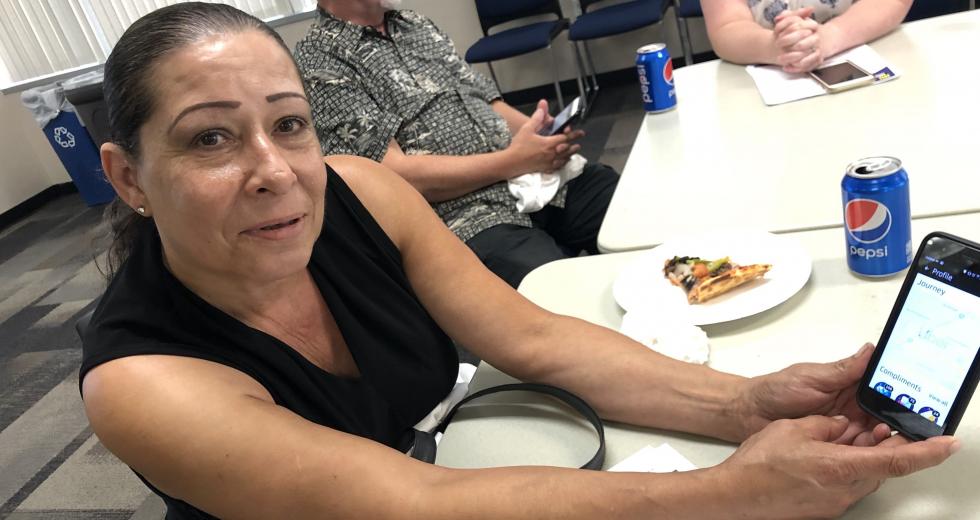Do you freelance in California? Have a side hustle? Drive trucks? Work construction? Do nails? Work on political campaigns? Then you should be paying attention to a major employment fight coming to a head in Sacramento.
In coming weeks, the state Senate will begin hearings on a bill that will make it harder to classify workers as independent contractors, officially codifying a sweeping 2018 California Supreme Court decision. The so-called “Dynamex” bill, supported by organized labor and named for the court case, has made headlines for threatening the on-demand business model made popular by the likes of Uber, Lyft, Door Dash and Postmates.
Less discussed, however, is the extent to which Assembly Bill 5 could sweep up some 2 million workers across industries far from the sharing economy and tech sectors, from truck drivers and general contractors to nail salons and strippers. The proposal has so unsettled mainstream businesses that they’ve banded together with sharing economy disruptors to run an “I’m Independent” campaign.
The legislation would rewrite the rules for when a worker is deemed an official employee, upending longstanding employment practices by newspapers, winemakers, private investigators, music schools and other enterprises.
“Does AB 5 have very wide repercussions? Yes, that’s what makes the negotiations very complicated,” said labor rights attorney Bill Sokol, who teaches employment law at San Francisco State University and is not a part of the negotiations.
California has long led the nation on employment practices and AB 5 may be just the beginning as policymakers wrestle with updating labor codes in today’s app-for-hire world. Though the high court decision clearly raised the bar for treating workers as independent contractors rather than full employees, the devil is in the details that will be spelled out in the pending legislation.
So AB 5 is being lobbied heavily both by business advocates and by organized labor, which seeks to ensure that gig economy workers have workplace protections, including the right to collective bargaining. It has also put Gov. Gavin Newsom, who wants to be viewed as an ally to both labor and tech, in an awkward position.
“Everything is up for grabs,” Sokol said. “There’s no way to predict who’s going to end up with what. But labor recognizes that the American workplace they have traditionally organized — those worker relationships — have changed, and the laws have not kept up with them.”
Worker protections in the new economy
Labor groups led by the 2 million-member California Labor Federation have united behind the proposal to limit the use of independent workers. Their contention: that the gig economy has opened the door to mass exploitation of low-wage workers, a trend that is worsening income inequality.
Too many employers misclassify employees in order to cut costs, the unions argue, and strong curbs on the use of independent contractors, who aren’t eligible for many of the benefits and workplace protections mandated for regular employees, would slow that. Those curbs would also make it easier to reach groups, such as general contractors, that have long been difficult to organize.
But business advocates warn the change would dramatically ramp up labor costs in California, and have dire consequences for the state’s economy. In some sectors, such as ridesharing, widespread contracting isn’t even the long-term business model — it’s just an intermediate phase on the way to automation. Uber or Lyft, both headquartered in San Francisco, might stop operating in California altogether, they say.
Their hope is to carve out a third way that would allow employers to grant some benefits without having to categorize workers as full employees.
“We have a completely different economy,” said Jennifer Barrera, executive vice president at California Chamber of Commerce. “We have a huge group of individuals who really value their flexibility and control over their own schedule and I don’t think it has to be one or the other.”
What is the Dynamex decision?
The California Supreme Court decision in Dynamex Operations West, Inc. v. Superior Court of Los Angeles dealt with a same-day courier service that, to save money, had converted all its employees to independent contractors. A former employee claimed the shift was a Labor Code violation, and the litigation that ensued ended up reinterpreting a longstanding test for classifying workers. The ruling instead established a three-part test for certifying independent contractors, with the highest hurdle being that the work performed must be outside the core of the company’s business.
Even though the Dynamex decision is already law, labor representatives say many companies have been flouting it. AB 5 would ensure that workers would not have to file suit on a case by case basis to seek enforcement.
“There’s a whole bunch of things that they’re currently being cheated out of, frankly,” said Steve Smith with the Labor Federation. “With respect to Uber and Lyft, it’s the exploitation they subject their workers to on a daily basis. Many of these workers are not receiving minimum wage, they are misclassified as contractors when they actually should be considered employees, meaning there’s a whole host of benefits they’re not getting that they should get like everyone else.”
In steering more people to employee status, the bill would force companies to offer basic worker protections such as guaranteed minimum wage, overtime pay, contributions to Social Security and Medicare, unemployment and disability insurance as well as workers’ compensation, sick leave and family leave. Workers could also get reimbursed for mileage and maintenance of their vehicles.
The state estimates it loses about $7 billion a year in payroll tax revenue due to worker misclassification that could be supporting schools, roads and other public services. And by avoiding unemployment insurance taxes and workers’ compensation premiums, businesses shift the burden to the state when workers get laid off, get sick or get injured on the job.
“These billion dollar companies can complain but we have to ask ourselves as taxpayers: Should we subsidize their business by subsidizing their workers?” said Assemblywoman Lorena Gonzalez, a former labor organizer from San Diego who is author of AB 5. “That’s what happens when you don’t adequately compensate workers.”
She dismisses the idea that Uber and Lyft will flee the fifth-largest economy in the world. More likely, the lawmaker predicts, Uber and Lyft will make the changes required by law because there’s a massive market for transporting individuals and goods in California. If they can’t manage it, she says, then someone else will.
Businesses seek compromise
Gonzalez’s bill is triggering pushback in part because the impact of the high court ruling is far broader than many Californians expected. Gonzalez says she’s heard, for instance, from newspaper publishers who want to keep using freelance journalists and beauty salons that rely on nail technicians. She’s even rattled folks in her own world of politics because her bill would reclassify campaign workers as employees, not contractors.
Chris Shimoda, vice president of government affairs with the California Trucking Association, says trucking has been a pathway for people without advanced degrees to make more money. In fact, about 80% of drivers in the industry have a high school education or less, he said.
But if firms are required to employ their own drivers, independent drivers who own their own $150,000 Class 8 heavy duty trucks may not be able to find work.
“We all agree there should be a pathway, especially for the blue-collar working class to rise up the economic ladder,” Shimoda said. “It’s just, what are the rules for the labor and employment law side of things? If there are specific things that have been abused, then what are those and how do we reconcile that through this bill?”
As his association works to ease the potential impact of AB 5 on those drivers, the trucking industry has challenged the Dynamex decision in federal court, arguing that federal laws governing motor carriers preempt the state test.
Peter Tateishi, chief executive officer of the Associated General Contractors of California, which represents construction firms, said the bill would disadvantage small businesses, women-owned and minority-owned firms that subcontract with builders because contractors won’t be able to get outside help.
As for Uber and Lyft, the rideshare companies have sought compromise and held backchannel negotiations with the Teamsters and Service Employees International Union. The Labor Federation, however, remains committed to full employment status for rideshare workers. As a result, the gig economy companies have sought support in the court of public opinion.
In an open letter, Uber Chief Executive Dara Khosrowshahi and Lyft co-founders Logan Green and John Zimmer proposed maintaining their drivers’ freelance status but granting access to some employee benefits such as paid time off and retirement accounts. The executives, whose combined worth is over $1 billion, offered to form a new driver association to advocate for the drivers’ interests.
“We are public companies that tens of millions of people rely on for mobility and work,” they wrote. “If there ever was a time for new policies, it’s now.”
An independent coalition sponsored by business
This week, the “I’m Independent” coalition led Uber and Lyft drivers around the Capitol to meet with lawmakers and staff to voice their desire to remain freelancers.
“I’m very offended that they would think they’re doing us a favor by calling us employees,” said Vivian Mallory, a 60-year-old Uber driver in Sacramento. “We want better rates and we want more opportunities for benefits. I think we’re not against the bill being passed but I think we want changes in the language.”
Lyft driver Ann Glatt, 62, of Sacramento, joined Gig Workers
Rising after seeing her fares drop. (Photo by Judy Lin for
CALmatters)

“They’re taking the fun away from it,” Mallory said.
AB 5 supporters counter that drivers will continue to maintain a flexible schedule because rideshare companies, like any employer, can pay wages based on the number of hours worked.
On the other side are drivers like 62-year-old Ann Glatt, who joined the Gig Workers Rising movement after noticing her share of fares declining over time with Lyft. She says she’s lucky to make $700 a week and would like to see changes to the way the rideshare companies categorize their drivers.
“Teachers are in unions. We’re not able to unionize because we’re independent contractors,” Glatt said.
She added that the labels put on drivers can be misleading.
“Uber and Lyft are not transportation companies—they are platforms. So that makes us customers and the passengers are the end user. But really it kinda just means Uber and Lyft are not responsible for basic labor standards for people,” she said.
After speaking to CALmatters, Glatt said she stopped driving Lyft because she wasn’t able to make ends meet.
Doctors and hairstylists exempt
Requests for exemptions have so far succeeded in some sectors. Gonzalez has agreed to leave doctors, insurance agents, real estate agents, hair stylists and barbers who hold a booth rental permit, dentists, architects, engineers and accountants out of the law.
But business interests are pressing for more. Barrera said CalChamber would like to carve out licensed occupations, from court reporters to family therapists. While the author is committed to sorting through more positions, Gonzalez said the exemptions will need to stop at some point.
“I have a driver’s license,” she said. “That doesn’t make me a business owner.”
—
CALmatters.org is a nonprofit, nonpartisan media venture explaining California’s policies and politics. Comstock’s magazine is a CALmatters media partner.
Recommended For You

Dilemma of the Month: Switching a Full-Time Worker to a Contractor
A company is considering switching a full-time worker into a contractor after the employee requested to work from home. Can the company legally do this?

Gig Companies Beg for Relief from Pro-Labor Supreme Court Ruling
State and federal labor laws give employees a wide range of worker protections, from overtime pay and minimum wages to the right to unionize. But those rights don’t extend to independent contractors, whose ranks have grown dramatically in the gig economy.

Dilemma of the Month: New Overtime Laws
I’m a business owner in California and I’m worried about the impact of the new overtime wage rules in the federal Fair Labor Standards Act. How can I best prepare my business for the changes caused by the regulations?

Troubles of the Trade
As the Sacramento region fails to meet housing needs, builders scurry to train a much-needed new workforce
The Sacramento Area Council of Governments reported that between 2013 and 2021, the region needs to build about 105,000 housing units to meet demand. Dividing that number by the nine years means almost 12,000 units per year.



